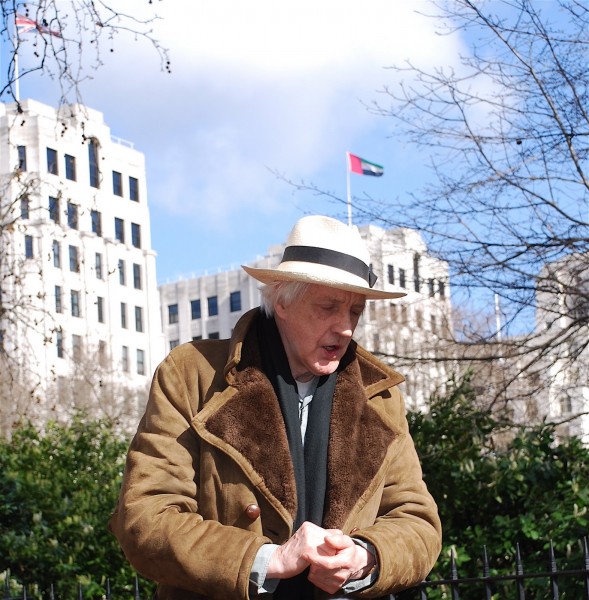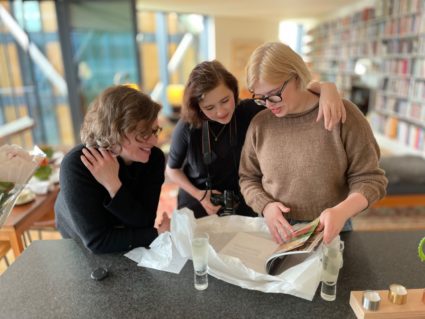the most superb London walk

Are you ready for a true travelogue from my esteemed city? I almost hate to tell you about the London Walk I went on yesterday, because… it’s the last one of its kind. Why do I so often get in on the tail end of something wonderful? Although that’s a very typically glass-half-empty way of looking at it. A more positive, chirpy person would think, “How lucky I am to have gone on Edward Petherbridge’s Last London Walk.” But no, I just growl about how deprived I am that it was The Last. It’s hard not to be carping when you’re about to be deprived of any more contact with a genuine crush. But I digress. Let me explain.
Yesterday morning found John and me shivering slightly at the Embankment Tube Station at which we were to meet up with the group to follow my lovely Edward around on his “Theatre Walk,” one of the most famous of all the London Walks (we went on the Jack the Ripper walk many years ago and it was really entertaining as well). What made Edward so much fun was his infectious sense of humor! Right from the beginning, standing up on a flight of steps above his adoring audience, his white hair lifting in the wind when he took off his straw boater to make a point, he had us all in stitches right away. “I’ve been told by one American lady that having me take her around London was like being shown around New York by Dustin Hoffman. It’s wonderful that he has that to fall back on.”
We were off, a group of perhaps 25 strong, around the corner to the Playhouse theatre which the infamous Jeffrey Archer bought some years ago (and quite soon gave up on). He and Edward had starred together in 2000 in “The Accused,” which Archer wrote, with the innovation of an audience-dictated ending: was his character guilty or innocent? The audience decided, and then there were two alternate endings to play out. Quirky. I wonder if it was any good? Edward’s demeanor on the subject was (I thought) reserved and perhaps a bit self-deprecating on the experience of having anything to do with such a nut as Jeffrey Archer. Apparently on his last night, he turned to the audience and said his last line, as he did every night, “Now I’m going to go back to work,” only on that last evening he added, “Making 75,000 pounds as an MP and 15 million as a novelist.” Terrible!
From there we were onto Craven Street, where Benjamin Franklin lived, subject of what must be a wonderful radio play, called of all things “Craven Street: Benjamin Franklin in London.” Edward pointed out eloquently the fact that while we have the gift of hindsight and can quite easily imagine being dressed like, living like Benjamin Franklin, the sight that would have greeted his eyes if he opened his door to us would have boggled the mind. Then we fought the wind and followed Edward through to the low-ceilinged curve of the arches under the Hungerford Bridge, leading to Charing Cross station, to stand outside what was once a Gatti music hall, and has now become Players’ Theatre and listen to Edward sing a lovely, touching song about sleeping rough in London. It was to our delight! He finished with a flourish and said, “We all need hyperbole in our lives. Actors get it automatically, but even we have to add some… For example, I often lose my keys. When Emily, my wife, suggests, ‘Where did you see them last?’ I simply have to shout, ‘Well, if I knew THAT…!”
We came upon a statue honoring Sir Arthur Sullivan, composer of among other things “The Mikado,” draped as you see here with a nearly-naked woman. “She is ‘the Muse,’ naturally,” Edward deadpanned. “She is so overcome with her muse-like responsibilities that all her clothing has simply fallen away. One does not like to imagine what the Muse on a statue of Oscar Wilde might be, here in our culture that so problematises sex. My daughter is reading English, and so I have learnt words like ‘problematise.’ They do make me feel so… academic.” At the river he stopped to tell us about the events of January 24, 1965, when he was rehearsing “Much Ado About Nothing” at the National Theatre across the Thames, with Franco Zeferelli, and Edward’s obvious closest rival in acting, Ian McKellen. “We were all just contemplating performing the entire play with Italian accents, when the death of Churchill was announced. We all, Franco included, stopped in silence. And then here, on this side of the river, Noel Coward sat in his hotel room at the Savoy, just behind you there, and contemplated the event as well. What a moment, both great men on either side of the river, at that great moment in history. And the cranes on the river, when the funeral barge passed them by, all bowed in respect.” To think I was just two weeks away from being born, when all this was happening a world away.
Then we were onto the back entrance of the famed Savoy Theatre, subject of the Mike Leigh film “Topsy Turvy,” which I would love to see, and the old stomping grounds of Henry Irving. And directly across the road from it Edward pointed out a gaslight, permanently lit, which is apparently fueled by the sewer fumes from the Savoy! Ick, if true. But entertaining as a story even if not. We crossed over to Covent Garden to stand outside the now-defunct Theatre Museum, whose demise Edward greatly regrets. “I went by early in the day on the final day the place was to be open, to find a sign saying, ‘The museum will not be open today.’ I found some janitor-ish fellow and asked him what was going on. ‘Well, it’s like this, sir. They didn’t want no trouble.’ So I told him I’d leave my petrol bomb in the bin.” From the corner where they museum used to be we could see the enormous Theatre Royal Drury Lane, as well as the infamous Bow Street Police Station, the only police station in the country with no blue lamp! Edward explained that once Queen Victoria had come out of the Royal Opera House nearby with guests, and when they asked what the blue lamp meant, she was forced to admit that it was a police station. Apparently this disclosure spoiled her evening, and so the lamp was ordered removed. She was not amused, one gathers. The Metropolitan Police have a different explanation for the removal, namely that the lamp reminded her of the blue room in which Prince Albert died. Now that would be an inconvenient sore spot. One does encounter blue in the world. “The police station is one no longer, unfortunately. It has been bought by a investor and will be turned into… a luxury hotel.” Laughter. “One wonders where, finally, any work will be done in this modern world that seems to have become an amusement park,” he said acidly.
Just behind us, then, was the famous Victorian flower market that once housed the real versions of Eliza Doolittle, selling her wares. And nearby the Royal Opera House, taking up an entire city block. At this point, one of our number spoke up and announced he had once been a stagehand there! “If any of the rest of you have such gems of theatrical history up your sleeves, do speak up,” Edward enjoined us. At this point, it was time to take our leave of him, sadly. He will be appearing next on television, he says, in an upcoming episode of the hugely popular series “Midsomer Murders,” and then, excitingly, will be off to New Zealand to appear as Lear. “And can you imagine: guess who will also be in New Zealand, at the same time, playing Lear? Ian McKellen. He has emailed me to say he is searching for the naturalism in the words. Hmmm…” I suppose it would be taking my crush a little overboard to fly out to Auckland, but it’s sorely tempting. What a day. What a man! Right now I am looking for a copy of a book of historical essays on Shakespeare that includes a piece of writing by him, and I have ordered my copy of his new book, “Pillar Talk: Backcloth and Ashes,” about a 5th century Syrian saint.
Ah, well, back down to earth. But sadly, this was his last London Walk. Just too difficult to work into his schedule of work. I’m so glad I was in on the last big adventure. Even my self-soaking walk home in sleet, hail and rain could not dampen my spirits.



